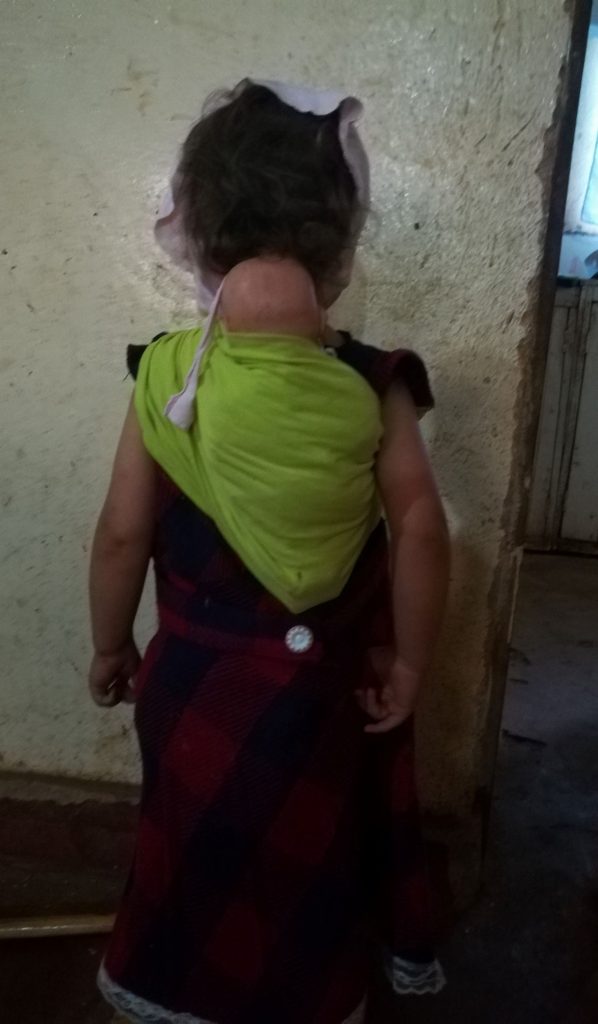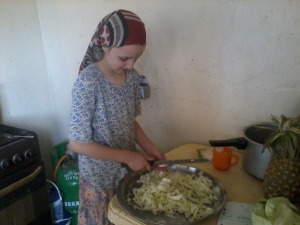Last week I received an email from a friend who expressed some concerns about her 12 year-old son’s laziness and lack of desire to help with work around the house, and asked for my advice. In her comments, she said, “I get concerned because he doesn’t want to go that extra mile. He doesn’t even want to go the first mile!” I sent her an unexpectedly long response with my thoughts on the topic of children and chores. Figured it would make a good blog post, since the blog muse rarely hits any more and, when it does, time to write is often elusive. So here goes…
————————————————-
I was chuckling reading your question, as I have often found myself saying to various children at different times, “Never mind going the extra mile–you’re not even going the first one!” I think it’s just human nature to be lazy and unfortunately, it’s our job as parents to conform those tendencies into something useful. Some of my children are good workers and look for ways to help/things to do, others will do anything upon request but rarely voluntarily, and then there are those who grumble through the most basic chores, as if it were the end of the world. (Of course, sometimes all the kids show these various character traits at various times.) We try to teach frequently about the value of work/the importance of diligence (either family devotional times or my time with the kids during the day/homeschooling, etc.) and at a time when they’re not being defensive/rebellious and feeling like I’m correcting them because they’re NOT doing what they should. As for correction when needed, it depends on the situation/reason.
If they’re not working due to a bad attitude, I do try to be encouraging rather than just corrective (“I know you want to do your project rather than what I’m asking, and I’m sorry. But we all need to do our part and serve one another. Try to do it cheerfully as unto the Lord, and you’ll find that you can back to what you were doing pretty quickly.”) Then I tend to leave them alone and let them have a bad attitude if they want to. It surprises me the number of times my encouragement leads to (eventual) repentance over the bad attitude towards work.
If it’s an ongoing problem with laziness, I tend to be a little more firm. (“It’s my job to prepare you for adulthood and if you don’t learn to work you will not be able to provide for yourself, never mind for a family if you should have one. That would be shameful, as our witness to others often comes from our example in working hard with our hands–1 Thessalonians 4:10. So you’ll have to learn to do the job and do it well. I expect you to do your work in good time and do it thoroughly, or you can expect some spankings.” Sometimes the admonition is enough (though the work might then get done with a less-than-stellar attitude) but other times they do need that spanking. If not a spanking, definitely consequences (such as other chores to complete so that they can “practice” working hard!).
Of course, sometimes even my best workers “don’t feel like it,” and I understand that because occasionally I feel the same way. In that case, I usually pitch in and lend a hand, as “many hands make light work.” I usually find that the example helps and they often get right back to working cheerfully and I even find them “going the extra mile.”
In all cases, I try to model hard work for my kids and almost always refuse to ask them to do anything in terms of work if I am not also working alongside of them (if not on the same task, at least *something.*) Then if they are complaining or not wanting to do a job, I can gently remind them that we ALL have a responsibility to pitch in and they are not being asked to do something that others are not also doing. Sometimes the team mentality helps to encourage. Exceptions are if someone is sick or unable to work (even me!), in which case everyone is encouraged to pitch in and serve to help out for those who are unable.
Though it is hard and I sometimes am too distracted/busy, I do try to check all the children’s work as they finish. Anything that is not done well gets a verbal correction or “reminder” for what to do differently or better next time. If the job quality is really unacceptable (standards vary according to age an ability) and I think it’s because of laziness/desire to get back to playing or personal projects, I have them re-do the job and sometimes even follow-up with an additional task “because they obviously need practice with how to work hard and do an acceptable job.” This usually keeps things running smoothly.
It helps to have times devoted to work when everyone knows that they will have responsibilities, but as you said there are inevitable times when other things need to get done. Don’t be too discouraged about what you perceive as a character deficiency. Just keep on teaching in a positive manner and correcting when needed.
Some questions to ask yourself/things to consider…these are ways that I self-evaluate, which may or may not be applicable in your situation:
–are you investing in your relationships with your kids so that they feel valued and loved by you, and not just that they are appreciated by you for the work that they do?
–Are you modeling cheerful labor and encouraging a positive attitude in various ways, rather than making household jobs seem burdensome?
–Are you encouraging good work and helping the children see the benefit and blessing of what they do, instead of only correcting problems when they arise?
–Are you being realistic in your standards in regard to quality of work and ability in doing various jobs?
–Boys really are different than girls. I find that I am asking my boys to participate less and less in kitchen work (especially dishes) BUT they are the ones who do the shopping, which is a big responsibility…My oldest son is the plumbing and electrical “go-to” and he often does repairs to bikes and other things around the house, so I think that’s a “fair trade” in releasing him from more of the mundane household tasks. My next-oldest boy is not as mechanically inclined as his brother, but he does enjoy cooking so I’m trying to teach him more in the kitchen (still need to devote more time to that) and he willingly takes care of the animals and works in the garden. So, does your son have work that he prefers, which you can delegate to him “in exchange” for other people doing tasks that he doesn’t like so much? Not that this is always possible, and I think all children need to have proficiency most things. Not to mention, often in life we must do things we don’t “prefer,” and that’s a good lesson for children to learn–even my oldest does dishes from time to time!–BUT, in the short-term sometimes it does help attitudes about work if one can take a break from chores that are particularly burdensome.
–Generally speaking, do you have regular and expected times for chores to be done? We almost always do “wake-up jobs,” something small after breakfast and family devotions (breakfast dishes, quick clean-up to make the house presentable, etc.), and then afternoon jobs (supper prep, clean-up from the day’s activities, bringing in the laundry, etc.) If the children know to expect this, they are less inclined to feel frustrated about projects/play time interrupted, etc. Of course if you always felt that what you were doing was being interrupted, you wouldn’t like it either. If you are asking for an “unexpected” job to be done, a “five minute warning” if they’re in the middle of something is usually appreciated and makes the work less offensive. And although I do expect children to obey a request “just because” and not always need to know “why,” they certainly respond much better to those big or unexpected jobs if you can provide some reasoning and encouragement. (“I know weeding the garden is a big job, but those weeds are going to be flowering if we don’t take care of them and that will give us even MORE to keep up with! We’ll all work together and try to make it easier for everyone.”)
–Do the children have a good balance between school, chores, and personal free time? Of course we are preparing our children for a lifetime of work, but they are children, after all. At age 12, your son should be investing perhaps 3-4 hours in “school” (I find that my older children can complete all their assignments in that amount or less *IF* they are being diligent…which sometimes they are NOT). Then, a roughly equivalent amount of time in actual work, if you have enough for him to do (indoors, outdoors, or in serving others in some way). Of course you have family times where you do various things, and meal times, but that should still give him a good couple of hours of personal/free time during the day. Of course, it’s important to intersperse work with appropriate short breaks, etc. For example, even though our mornings are devoted to “school” (roughly 8:30 AM to 12:30 PM), I tell the kids that they should do their math or language arts first, then they can have a 10-15 minute break. After that, they get the the other primary assignment done and move on to whatever is scheduled for “electives.” If we’re working on a long job (like harvesting maize/beans or weeding the garden or our Saturday whole-house cleaning), we usually work for 30-45 minutes then take a 10 minute break. Sometimes a cup of juice or a small snack goes a long way. 🙂
I admit, I used to be a bit more of a “drill sergeant” in regards to the children’s work…I think I have become much more gracious in how I ask the children to do things, more realistic in my expectations, and a lot more encouraging of sincere effort, as well as more instructive in taking advantage of “teachable moments.” I have definitely seen that my approach and attitude affects a lot in terms of how the children respond. It is true that they choose their own attitude…but if they “choose” a bad one, I can either exacerbate it or reduce it by how I respond. This has become more than obvious throughout my oldest son’s early teenage years.Re: boys-turning-into-young men…which your son is… they definitely don’t like to be tied to Mama’s apron strings (*wink*). So, is your son spending good time with his Dad? Does Dad give him jobs to do so that he can feel like he is contributing in a “manly” way to the household? In addition to the things you are asking him to do, is he learning practical skills that will help him feel productive/grown up? (I’m not meaning for this to sound sexist, which it might…but boys and girls are definitely different and I think it is important to acknowledge that in our parenting.) I struggle with this a little more with my second son than I did with the first, as my oldest has always wanted to do the things his Dad does and has just has a mind/aptitude for various skills, which his brother has little interest in and aptitude for. However, I’m not too worried about it. I’m keeping focused on the primary thing (“seek first the Kingdom of God!”) and I figure the future will unfold itself. He generally has a cheerful attitude about work, and although he doesn’t have a penchant for manual labor (particularly things like weeding the garden), I do find that he is particularly meticulous in his work, which I try to encourage and compliment. If the two boys are “sharing” garden weeding, the oldest gets twice as much done in half the time (to his brother’s frustration), BUT the younger one does a much more thorough job, whereas his brother just “gets the job done.”
Whatever the issues are, remember that you can only do your part in training, encouraging, and disciplining, and there is much that you have to leave to the ongoing work of the Holy Spirit. There is seed time and harvest, and we are given our children for 18-ish years for a good reason…they need that long and that much ongoing work on our part. And as you know by now, each one his his/her strengths and weaknesses, so we need to encourage the strengths and work on the weaknesses, without expecting that everyone will be of the same ability/personality, etc. For example, one of my daughters, at only age 9, is a VERY capable household helper. She knows what generally needs to be done and jumps in to help. She can prepare complete meals on her own and willingly does so. In fact, if she is “bored,” she typically looks for work to do. Since her personality is somewhat like mine and I definitely appreciate her help, it is easy for me to encourage her, but I find that it somewhat embitters her older sister (age 11) when she gets too much complimenting (from me or others). My oldest daughter just doesn’t have that mind or that work ethic in regard to many of the household tasks (though she generally does whatever she is “asked” to do and does it fairly well) BUT she is an excellent seamstress-in-training, a great artist and storyteller, and generally very creative–all gifts which I know the Lord will use in His special way.
I hope you have been encouraged, or perhaps challenged, by these random thoughts on children and chores. Feel free to add your own thoughts (or questions) in comments!



